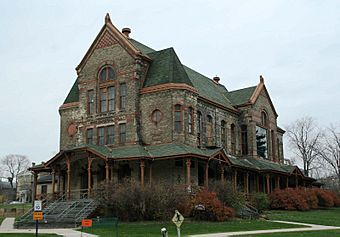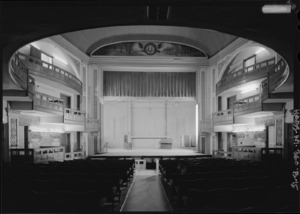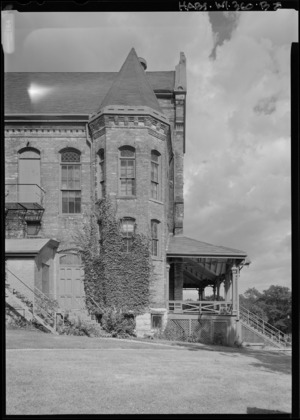Ward Memorial Hall facts for kids
Quick facts for kids |
|
|
Ward Memorial Hall
|
|

Ward Memorial Hall
|
|
| Location | 5000 West National Avenue, Milwaukee Soldiers Home, Milwaukee, Wisconsin |
|---|---|
| Built | 1882 |
| Architect | Henry C. Koch |
| Architectural style | High Victorian Gothic Revival, Romanesque Revival |
| NRHP reference No. | 84003748 |
| Added to NRHP | September 6, 1984 |
Ward Memorial Hall is a historic theater built in the 1880s in Milwaukee, Wisconsin. It is located on the grounds of the Milwaukee Soldiers Home, a place built to care for volunteer soldiers after the Civil War. The building is a special part of the Northwestern Branch, National Home for Disabled Volunteer Soldiers Historic District.
The building was more than just a theater. It also had a store, a restaurant, and even a train station inside! In 1984, it was added to the National Register of Historic Places to help protect it as an important piece of American history.
Contents
A Place for Entertainment and Community
Ward Memorial Hall was built between 1881 and 1882. Before it was built, soldiers living at the home watched shows in a chapel. The home was growing, and the veterans needed a bigger and better place for recreation and fun.
One Building, Many Uses
The famous Milwaukee architect Henry C. Koch designed the hall. He used popular styles from the time called Gothic Revival and Romanesque Revival, which made buildings look like old European castles and churches.
This building was unique because it served many purposes. It had:
- A 900-seat theater for shows and meetings.
- A commissary, which was a store for the soldiers.
- A restaurant for meals and socializing.
- A passenger station for the railroad.
A wide porch, called a veranda, wrapped around three sides of the building, giving people a place to relax outside.
Changes and Famous Features
Ward Memorial Hall is one of the oldest theaters in Wisconsin. When it first opened, the theater's ceiling was decorated with beautiful paintings called frescoes. These paintings were later covered up when the theater was expanded, but they are still hidden above the newer ceiling.
In 1888, a large stained glass window was added to the building. It shows the famous Civil War general and former president, U. S. Grant, on his horse. This beautiful window was a gift from the Grand Army of the Republic, an organization for Union Army veterans.
Over time, the other functions of the building moved to new locations. The train station, post office, and store were all given their own buildings. This allowed the theater to be expanded in 1898. The floor was sloped and a balcony was added so that the audience could see the stage better.
A Stage for Stars
For many years, Ward Memorial Hall was the main place for entertainment at the Soldiers Home. It hosted all kinds of professional shows, including lectures, concerts, and plays. Many famous performers appeared on its stage, including:
- Will Rogers
- Sophie Tucker
- Ethel Merman
- Nat King Cole
- Liberace
- George Jessel
- Bob Hope
- Burns and Allen
After World War II, fewer veterans used the theater, and it slowly fell into disuse.
Saving a Historic Treasure
In the early 1980s, people began working to save the old theater. A local theater group, the Milwaukee Players, used it for rehearsals from 1981 to 1992. Groups like the Soldiers Home Foundation and the American Legion started to raise money for repairs.
The famous pianist Liberace, who grew up in Milwaukee, offered to help. He had performed at the theater as a young boy when he visited the veterans with his mother in the 1920s.
Unfortunately, fundraising efforts did not raise enough money, and today Ward Memorial Hall is empty. The building is in poor condition, mostly because of water damage.
Because of its historical importance and its poor condition, the building was placed on the National Trust for Historic Preservation's list of America's 11 Most Endangered Historic Places. This has helped bring more attention to the need to save Ward Memorial Hall and other historic buildings at the Soldiers Home.
See also
- National Register of Historic Places listings in Milwaukee, Wisconsin
- Soldiers' Home Reef
- National Home for Disabled Volunteer Soldiers
- National Home for Disabled Volunteer Soldiers, Northwestern Branch
 | Emma Amos |
 | Edward Mitchell Bannister |
 | Larry D. Alexander |
 | Ernie Barnes |



